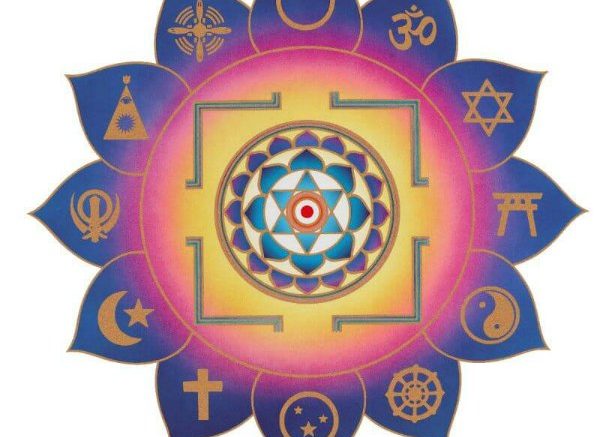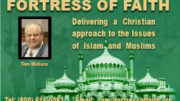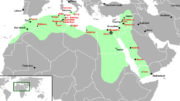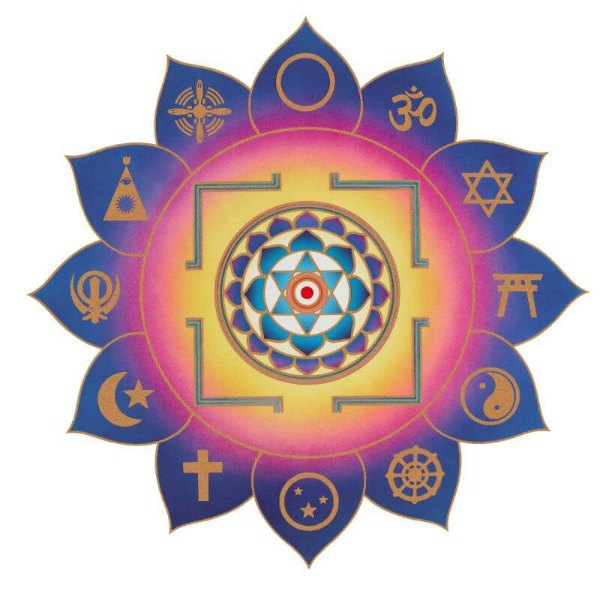 Article 2 in the series (see full lnterfaith list here) and also see indepth webinar by Dr. Mark Christian, called Beheading the Church here on American Pastors Network.
Article 2 in the series (see full lnterfaith list here) and also see indepth webinar by Dr. Mark Christian, called Beheading the Church here on American Pastors Network.
by Dan Wolf (see full lnterfaith list here)
Inter-Faith Myths and Islam presented ideas expressed during two Richmond ‘inter-faith’ events about Islam. Ignored is the fact many of these ‘truths’ are not only contrary to, but incompatible with Christianity. We will cover some of the same ground presented in the first article, but this time with a basis in Christian thought.
This is critical for two reasons. First, the Muslim Brotherhood seeks to manipulate other religions by subverting the inter-faith movement. We know this from the documents recovered in the Holy Land Foundation trial.[1] Second, many Christians today do not have a very deep understanding of their own faith, which leaves them vulnerable to manipulation. But let me reiterate once again, the underlying issue is not Muslims but Islam’s ideology.
So where to begin? Islam created no new ideas in terms of who God is or the relationship between man and God as we will see below. Two timelines are presented to provide some context for this discussion. The first timeline details when some people relevant to the development of Christian and Islamic thought lived. It is of course not exhaustive, but those included are significant. Individuals influencing Christian thought lie above the timeline, those relevant to Islam below it.
A few points of historical reference are in order. First, Plato and Aristotle were both pagans, but their thoughts had great influence on later generations. But there is a difference in each one’s orientation, as shown in Raphael’s painting The Schools of Athens. Plato is pointing to God and the heavens, Aristotle the earth and man. Creator versus created. Second, Augustine lived during the final days of the western Roman Empire in the early fifth century. Third, Plotinus’ book The Enneads outlines the neoplatonic thought influencing the Islamic concept of Allah. Aristotle’s Hellenistic thought also influenced Islamic thought and concepts. Note Muhammad lived around 600 AD after everyone just noted, except Thomas Aquinas.

Figure 1: Timeline of People Relevant to Christian and Islamic Thought[2]
There are several important points to also note in regards to the Bible itself. The Old Testament books (Genesis through Malachi) were written about 2,500 to 3,500 years ago. The first five books of the Old Testament (Genesis, Exodus, Leviticus, Numbers, and Deuteronomy) are the Jewish Torah. The earliest manuscripts we have for the Old Testament are the Dead Sea Scrolls which date to the first and second century BC.
The New Testament books (the four Gospels of Mathew, Mark, Luke, and John through the book of Revelations) were all written in the latter half of the first century AD. The earliest scrap we have from the New Testament comes from the Gospel of John and dates to about 114 AD. We have manuscripts for most of the New Testament dating to within 200 years of their original writing, and manuscripts for the entire New Testament within 300 years. Both the number of manuscripts (over 5,300) and their consistency are unequalled when looking at Ancient World documents.
The second timeline outlines Islam’s development within its historical context. The Qur’an’s verses were collected after Muhammad’s death in the seventh century, but due to the nature of the Arabic language at that time many variant readings developed from these writings. Variant readings result from the insertion of different pointing and diacritical marks into the text. These additional markings resulted in different meanings being derived from the same text. It was not until the tenth century that the fourteen accepted variant readings that are today’s Qur’an came into existence.
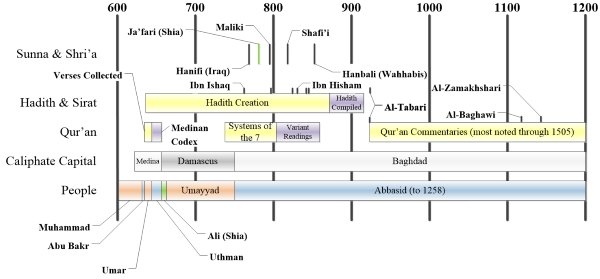
Figure 2: Timeline of Islam’s Development[3]
Ignaz Goldziher wrote about these outside influences on Islam early in the twentieth century. He said,
The dogmatic development of Islam took place under the sign of Hellenistic [Greek] thought; in its legal system the influence of Roman law is unmistakable; the organization of the Islamic state as it took shape during the Abbasid caliphate shows the adaptation of Persian political ideas; Islamic mysticism made use of Neoplatonic and Hindu habits of thought. In each of these areas Islam demonstrates its ability to absorb and assimilate foreign elements so thoroughly that their foreign character can be detected only by the exact analysis of critical research.
With this receptive character Islam was stamped at its birth. Its founder, Muhammad, did not proclaim new ideas. He did not enrich earlier conceptions of man’s relation to the transcendental and infinite…. The Arab Prophet’s message was an eclectic composite of religious ideas and regulations. The ideas were suggested to him by contacts, which had stirred him deeply, with Jewish, Christian, and other elements, and they seemed to him suited to awaken an earnest religious mood among his fellow Arabs. The regulations too were derived from foreign sources; he recognized them as needed to institute life according to the will of God.[4]
Many of the ideas incorporated into Islam came from what Christianity considers heresies. From heretical Christian sects ideas such as Jesus is only a man, and as a man his death on the cross would have meant nothing as there would have been no divine sacrifice given. Gnosticism began developing in the second century. From gnosticism Islam borrowed ideas such as Jesus was only a prophet, and he was not crucified as God would not let one of His prophets die such a humiliating death.
From its pagan cultural roots Islam adopted the ideas of slavery, polygamy, demonic pollution, and easy divorce (for the man at least). Also, the entire pilgrimage to Mecca (the Hajj, one of the five pillars of Islam) was taken from pagan practices. Practices included kissing a stone in the Kaaba itself, circling the Kaaba seven times representing the seven known planets, and casting stones at pillars in the town of Mina to ward off evil. The Kaaba is the building at the center of Islam’s most sacred site, the mosque in the city of Mecca. The worship of stones and other objects by Arab tribes is documented by both the Roman historian Tacitus and early church father Clement of Alexandria in the second and third centuries.
Finally, the concept of Allah was significantly influenced by the Roman pagan philosopher Plotinus. Besides his book The Enneads, where he wrote about his concept of first cause (God) in the third century, he also wrote books on basic logic and geometry that were used in Arab education into the twentieth century. It is to the topic of God that we now turn.
Myth: Muslims and Christians Worship the Same God
Unlike God, Allah is pure will; without any being, nature, or essence. He is absolutely inscrutable. Islam presents a form of nominalism, that universals exist as names only without any basis in realty. The conclusion of this line of thought can be expressed as follows,
Allah is absolutely One, He is only absolute will.
As Allah is only absolute will, He has no Being.
As Allah has no Being, He has no essence (nature).
As Allah has no essence, He has no essential attributes.
As Allah has no essential attributes, any attempts to depict Him are blasphemy.[5]
The upshot of this line of thought is that Allah is the cause of all things, but those actions do not tell us anything about Allah’s nature. They are merely the things Allah causes. Allah is the source of all actions, because there is nothing else within this belief system capable of causing anything. Therefore, Allah must be the cause of both good things and evil things. The sura below supports this notion. It should be mentioned the Qur’an is written in first person. References to terms such as I, Me, and We refer to Allah. Other terms, such as Beneficent and Merciful, are some of the names of Allah. From sura 32.13,
And if We had so willed, We could have given every soul its guidance, but the word from Me concerning evildoers took effect: that I will fill Hell with the jinn and mankind together.
This idea is the opposite of Christianity. God is good. Evidence of His love lies in this, that He first gave us life. For to be is surely better than not to be. Why would a rational orderly Creator create something that He does not love? It is man’s turning away from God and His purpose for us that is the cause of evil. Evil is our fault, God is not to blame.
A couple more differences before we close this section. First, within Islam the Trinity (God the Father, Son, and Holy Spirit) is considered to be blasphemy. Sura 5.73 says They surely disbelieve who say: Lo! Allah is the third of three; when there is no God save the One God. If they desist not from so saying, a painful doom will fall on those who disbelieve.[6]
Another gnostic influence on Islam in terms of who the Trinity consists comes from sura 5.116. Instead of a single essence with three beings (one God as Father, Son, and Holy Spirit), we have the following,
And when Allah says: O Jesus son of Mary! Did you say unto mankind: Take me and my mother for two gods beside Allah? He says: Be glorified! It was not mine to utter that to which I had no right. If I used to say it, then You know it. You know what is in my mind, and I know not what is in Your mind. Lo! You, only You, are Knower of Things Hidden.
Compare that to the following passages from the Gospel of John within the Bible.
In the beginning was the Word, and the Word was with God, and the Word was God. He was with God in the beginning. (John 1:1-2)
When the Counselor comes, whom I will send to you from the Father, the Spirit of truth who goes out from the Father, he will testify about me. (John 15:26)
Islam’s concept of God in the above passages attempts to confine Him to strictly physical concepts, but He is beyond space and time. Islam’s ideas are not only contrary to Christian thought, they are incompatible with it. John describes anti-Christs in his first and second letters. Relevant passages include,
And every spirit that does not confess Jesus is not from God; this is the spirit of the antichrist, of which you have heard that it is coming, and now it is already in the world. (1 John 4:3)
For many deceivers have gone out into the world, those who do not acknowledge Jesus Christ as coming in the flesh. This is the deceiver and the antichrist. (2 John 1:7)
Islam denies both the Trinity (Father, Son, and Holy Spirit) and the incarnation of God through Christ. These views could not be more opposite and in fact from a Christian perspective are blasphemy.
Myth: Man Has the Same Place Within Creation Between Islam and Christianity
Within both Islam and Christianity, all things were created by God. But there the similarity ends. As Allah is pure will, man cannot be created in Allah’s image. Instead man is Allah’s slave and his sole purpose for existence is to worship Allah. The following three passages from the Qur’an testify to this position.
I created the jinn and humankind only that they might worship Me. (S51:56)
There is none in the heavens and the earth but comes unto the Beneficent as a slave. (S19:93)
The (faithful) slaves of the Beneficent are they who walk upon the earth modestly, and when the foolish ones address them answer: Peace. (S25:63)
Compare this notion to the following passage from the Bible. Galatians is one book within the Bible’s New Testament.
But when the fullness of the time came, God sent forth His Son, born of a woman, born under the Law, so that He might redeem those who were under the Law, that we might receive the adoption as sons. Because you are sons, God has sent forth the Spirit of His Son into our hearts, crying, “Abba! Father!” Therefore you are no longer a slave, but a son; and if a son, then an heir through God.
However at that time, when you did not know God, you were slaves to those which by nature are no gods. But now that you have come to know God, or rather to be known by God, how is it that you turn back again to the weak and worthless elemental things, to which you desire to be enslaved all over again? (Galatians 4:4-9)
It is ironic that the form of adoption mentioned above in Galatians, before Islam, was the very form that existed within the Arab culture. When someone was adopted they became in every respect a son or daughter, they were no different from a natural born child. Arab culture had this aspect of our nature right before Islam.
We can go further yet. From the Gospel of John again, we have the following words from Jesus himself,
No longer do I call you slaves, for the slave does not know what his master is doing; but I have called you friends, for all things that I have heard from My Father I have made known to you. (John 15:15)
Myth: The Relationship Between God and Man Is the Same Within Islam and Christianity
As God’s and man’s nature both differ between Islam and Christianity, it should be no surprise that the relationship between God and man also differs. Within Islam man simply exists to obey. Within Christianity, man was intended to know his Creator. We are to have a personal relationship with Him and to become good, like He is, to the extent that we are able, given the gifts which each one of us has been blessed.
Such a profound difference rests on the difference in man’s very nature between Islam and Christianity. Within Christianity, God gave man His image.[7] This is possible because God had a being, nature, and essence to give. As Allah is pure will, there is no basis for man receiving God’s image. In the words of St. Thomas, how can one give what they have not got? Within Islam man is no different from the rest of creation.
Clement of Alexandria about 200 AD said there are several implications arising from the special place that man has in creation. These are; (1) the need to know oneself, (2) we all have an equality of nature, (3) we all have choice, and (4) we have all been given freedom.[8]
We have each received the gift of free will, freedom. It is a part of our very nature. We are each responsible for our own actions. As such we are called to do good out of love for our fellow man, to perform individual acts of charity. Charity is not the role of government, but our responsibility and ours alone. Those who advocate wealth redistribution through government do not support Christian tenets.[9]
I mentioned earlier that the concept of Allah was heavily influenced by Plotinus’ ideas written in the third century. Within Christianity, man is by nature free. This is a positive attribute, and necessary for us to fulfill our shared purpose. However, Plotinus did not view freedom as a positive attribute. Instead freedom is the negation of a negative. It is what you have when you are not being coerced as your natural state is that of a slave. Within Islam your natural state is not to be free but rather a slave.
How much more different could Islam and Christianity be? One final question. Why are these inter-faith events only being held in secular venues (such as colleges) and churches, and not in mosques where Muslims can hear the truth as well? After all, we are not only called to seek the truth but to speak it to those who do not know it, the very opposite of ‘inter-faith’ principles. Is it Christians in need of the truth or Islam?
It is my profound wish that you learn and understand the truth, wherever it leads you. There are many good books that have been written on the subject matter in these two articles. I’ve recently written a book that attempts to present in a single work the relevant differences between Islam and Christianity across these and a number of other dimensions. More importantly, it points to many original sources where one can go to learn more. I hope that you will consider it as you search for the truth on your journey.
Dan Wolf is a researcher, analyst, and author. He has written three books examining the relationship between faith, freedom, virtue, and charity. Together these form the cornerstone of our purpose, and our society’s foundational principles derived from those relationships. Links to his work can be found at the Living Rightly website.
[1] A copy of the Muslim Brotherhood memorandum is available in Arabic and English at https://www.documentcloud.org/documents/228562-elbarasse-search-3.html. Accessed May, 2017.
[2] Wolf, Dan, A War for God, p. 8, living rightly publications, 2017.
[3] Ibid, p. 34.
[4] Goldziher, Ignaz, Introduction to Islamic Theology and Law, pp.4-5, University of Princeton Press, 1981.
[5] Wolf, Dan, A War for God, p. 132, living rightly publications, 2017.
[6] Pickthall, M.M., The Meaning of the Glorious Qur’an, amana publishing, 1999.
[7] Genesis 1:26, Then God said, “Let Us make man in Our image, according to Our likeness; and let them rule over the fish of the sea and over all the earth, and over every creeping thing that creeps on the earth.”
[8] Wolf, Dan, A War for God, p. 121, living rightly publications, 2017.
[9] Wolf, Dan, Collectivism and Charity, pp. 7-17,living rightly publications, 2016.

